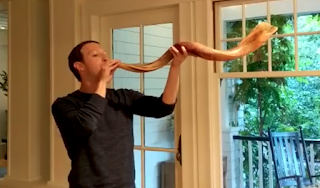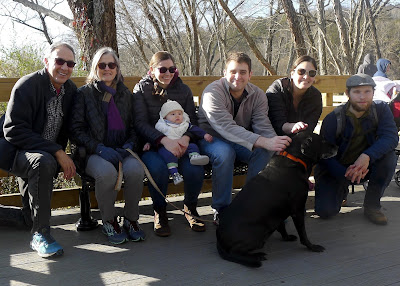Still recovering from my post Yom Kippur gluttony, I awoke early to read the New York Times and came upon an article on Mark Zuckerberg and Marc Benioff, two Jewish techno-billionaires, blowing the Shofar. The digital version of the article featured a video of the Zuckerberg, in his ubiquitous long-sleeve tee shirt, blowing the shofar at home while an unseen child wailed in the background. (https://www.nytimes.com/2018/09/17/style/marc-zuckerberg-blowing-shofar.html)
Like the Shofars (Shofarim? Shofarot?) used in my synagogue during recent High Holyday services, Zuckerberg’s Shofar appeared to be approximately four-feet long, it’s length far exceeding the length of his left arm which held it in place. At our synagogue, we had four men (although I do not believe any of them were techno-billionaires) with equally elongated Shofars serenading us with Tikiahs, Shivarims, and Truahs from different parts of the sanctuary. The coordinated blowing was orchestrated to create a dramatic impact on the Rosh Hashanah worship. Unfortunately, it also confused the more senior members of the congregation. All around me, octogenarians were seen adjusting their hearing aids.
My friend Sandy turned to me and commented “I don’t remember Shofars being so long”. Certainly, that was my memory. Shofars used to be of the 10-inch variety, carved with small notches along their edges. Shofars today all seem to be in the 3 – 4-foot helix variety - far cries from the diminutive size of our youths.
What also seems to have become elongated is the “T’kiah G’dolah” – the final blast of the Shofar in each cycle on Rosh Hashanah and at the end of Nelah, the concluding service on Yom Kippur. In my synagogue, it is not unusual for the T’kiah G’dolah to last 30 seconds or more, causing the blower’s face to turn a brilliant shade of red. I am concerned that one of them will have an aneurysm.
While I recognize that, to paraphrase, Freud, ‘sometimes a shofar is just a shofar’, to my thinking, the growth of elongated shofars and the final blasts of T’Kiah G’dolah, marks the rise of “Macho Judaism”, where men demonstrate their virility and alpha dominance, within the of context our Jewish rituals. These are, in fact, “the Days of Awe”.
Another demonstration of Macho Judaism seems to be the “Hagbai” clean and jerk. Each year select men are called upon to demonstrate their vitality by lifting the Torah after the reading has been completed. The contestants demonstrate their strength and skill by seeing how many sections of the Torah they can unravel before the lift. I believe the requirement is three, but, this never seems to suffice. Seven or eight will ensure a positive murmur. I do admire these kosher strong men but also worry that a slight misstep will require all of us to fast for 40 days. I have nightmares of unrelenting caffeine withdrawal headaches. During these moments during the service, I was contemplating the need for a new pharmaceutical product “Jewagra”, to enable men to keep their horns and scrolls aloft longer. Jars of Alex Jones’s “Super Male Vitality” supplements might also do the trick. I added an additional “Al Chet” (“For the Sin”) for these wayward thoughts.
My synagogue is fully egalitarian, and women participate in all aspects of the service. But, in the 12 years I have been a member (and, perhaps, for the 60 years or so I have been attending synagogues), I have never seen a woman called to blow the shofar or lift the Torah. Women in our country join the Marines, are fighter pilots and serve as police officers and firefighters around the world. One would think they have the capacity to blow a shofar and lift a Torah.
The High Holy Days have passed, and Sukkot is upon us. Around the world, Jewish men will be hoisting long stalks of bamboo atop our booths. At our synagogue, the men will sanctify the holiday with “Cigars and Scotch in the Sukkah”. While I admire the alliteration, as a non-meat eater and non-smoker, I will demure. Don’t get me started on the Lulav. Sometimes a palm frond is just a palm frond.

